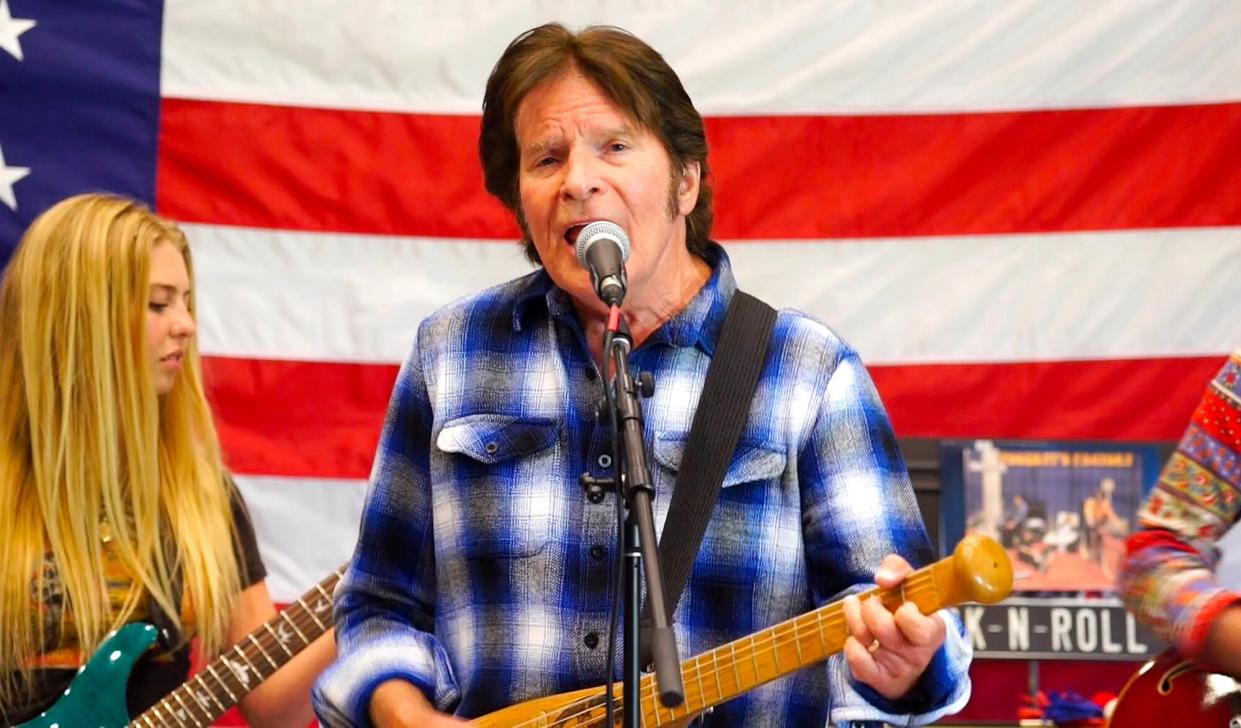John Fogerty Buys Control of Creedence Clearwater Revival Catalog After 50-Year Fight: 'Still in Shock'

- Oops!Something went wrong.Please try again later.
- Oops!Something went wrong.Please try again later.
Getty Images/Getty John Fogerty
After a contentious, five-decade struggle involving his former record company, rocker John Fogerty has gained worldwide control of the publishing rights to the dozens of classics he recorded with Creedence Clearwater Revival.
Fogerty, 77, told Billboard that he's "really kind of still in shock" over the purchase, which he has tried unsuccessfully to make several times over the years, first from Fantasy Records' Saul Zaentz, and later from Concord.
"I'm the dad [of these songs]. I created them. They never should have been taken away in the first place. And that hijacking left such a massive hole in me," he told the outlet. "The happiest way to look at is, yeah, it isn't everything. It's not a 100% win for me, but it's sure better than it was. I'm really kind of still in shock. I haven't allowed my brain to really, actually, start feeling it yet."
The "Fortunate Son" singer bought a majority interest in the global publishing rights to his CCR song catalog for an undisclosed sum from Concord, PEOPLE confirms. The music publishing company has owned the rights since 2004, when it bought Saul Zaentz's Fantasy Records.
Fogerty's history with Zaentz, who died in 2014, is a fraught one, and conflict with Zaentz and Fantasy over royalties contributed to the breakdown of Fogerty's relationship with his late brother and bandmate Tom in the 1980s.
The singer signed a deal with Fantasy in 1968, but relinquished his artist royalties to Zaentz in 1980 in order to get out of the contract, according to Billboard. Zaentz sued Fogerty five years later for $144 million, claiming that his solo hit "The Old Man Down the Road" was a rip-off of the CCR song "Run Through the Jungle."
Though Fogerty wrote both tracks, Zaentz claimed plagiarism, as he owned the latter. Fogerty eventually won the lawsuit, and his efforts to win back the $1.3 million he'd spent on legal fees reached the Supreme Court in 1993, Billboard reported.
For years, Fogerty avoided playing live any songs he'd written with CCR, as he didn't want Zaentz to profit off any of his performances.
He eventually changed his tune, telling PEOPLE in September that he'd finally made peace with it all.
"I certainly felt that I had been done wrong and cheated and lied to and all those other sorts of things, and at the center of all that was the music and the songs that I had created. But as time has gone on, there's another benefit for my having met Julie, and that was I decided I was going to start performing my songs again," he said. "I'm just really happy that my life turned out this way and I get to celebrate that music [now]."
RELATED: John Fogerty Talks New Creedence Clearwater Revival Documentary and Making Peace with His Past
When Concord acquired CCR's catalog from Fantasy in 2004, the company reportedly reinstated and increased Fogerty's artist royalties.
Billboard reported that Fogerty had previously tried to buy back the rights to his music in 1989 (negotiations fell through in the final stages after Zaentz doubled the price).
But 18 months ago, Fogerty and his wife and manager Julie realized the rights to his songs would soon turn back to him as they turned 56 under U.S. copyright law. An initial request to buy the songs was declined by Concord, but a deal was worked out with the help of Fogerty's former manager Irving Azoff, according to the outlet.
Post-sale, Concord will keep the CCR master recordings already in its catalog, and Fogerty said he's "not actively sitting around worrying about" obtaining them for himself.
He's also "not thinking about" selling his publishing rights, though recent sales by peers like Bruce Springsteen and Bob Dylan indicate he could see a windfall.
"The last thing on my mind is thinking about selling it, I want to enjoy it," he said. "It's good. That's where I'm at."

